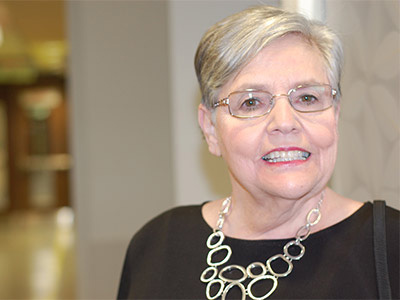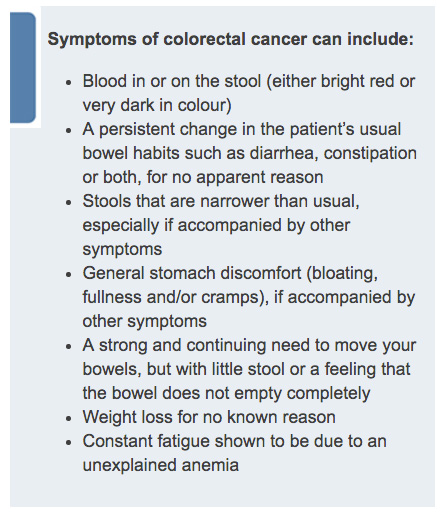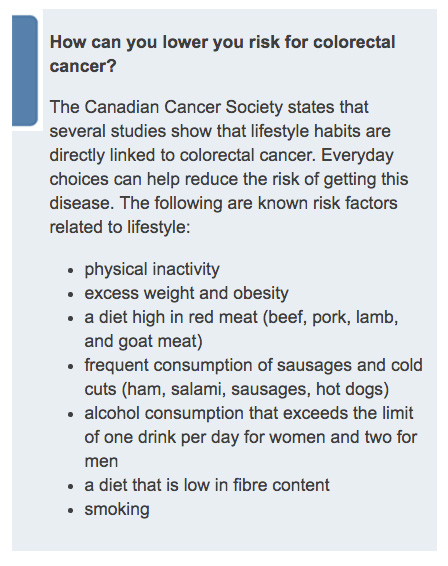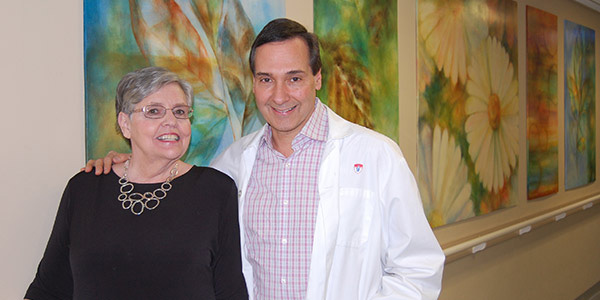
By Julia Asselstine, McGill University Health Centre (Source: MUHC Public Affairs)
With a strong family history of cancer and health challenges over the years Marguerite Dubeau was not about to take chances when she was offered to undergo screening for colon cancer. After all, her son and his wife were trying to have a baby and there was no way she was going to miss out on being a grandmother.
Dr. Alan Barkun, McGill University Health Centre gastroenterologist and epidemiologist, who had followed Marguerite for other health problems, facilitated the process. Sure enough, even though Marguerite did not have pain or signs of colon cancer she had a cancerous polyp.
According to the National Cancer Institute of Canada (NCIC), colorectal cancer (cancer of the colon and rectum) is the third most common cancer and the second most common cause of death from cancer for both Canadian men and women.
Can colorectal cancer be cured?
 Since there are very few symptoms associated with colorectal cancer, regular screening is essential. Screening is beneficial for two main reasons: colorectal cancer is preventable if polyps that lead to the cancer are detected and removed, usually at the time of colonoscopy, and it is curable if the cancer is detected in its early stages.
Since there are very few symptoms associated with colorectal cancer, regular screening is essential. Screening is beneficial for two main reasons: colorectal cancer is preventable if polyps that lead to the cancer are detected and removed, usually at the time of colonoscopy, and it is curable if the cancer is detected in its early stages.
“The fact is, colorectal cancer is a disease that can be prevented through regular screenings, a healthy diet and regular exercise,” explains Dr. Barkun, who says that more than 90 per cent of 12,000 colonoscopies at the MUHC are performed yearly for the prevention, detection, or surveillance of patients in whom colon cancer is of potential concern.
According to Dr. Barkun, if detected, colorectal cancer requires surgery in nearly all cases for complete cure, sometimes in conjunction with radiation and chemotherapy. “Between 80-90 per cent of patients are restored to normal health if the cancer is detected and treated in the earliest stages. However, the cure rate drops to 50 per cent or less when diagnosed in the later stages.” (See Symptoms sidebar, above)
Who is at risk for colorectal cancer?
 The risk of developing colorectal cancer increases with age. All men and women aged 50 and older are at risk for developing colorectal cancer, and should be screened. Some people are at a higher risk and should be screened at an age younger than 50, including those with a personal or family history of inflammatory bowel disease; colorectal cancer or polyps; or ovarian, endometrial or breast cancer, or rare genetic syndromes. (See “How can you lower your risk?” sidebar, left)
The risk of developing colorectal cancer increases with age. All men and women aged 50 and older are at risk for developing colorectal cancer, and should be screened. Some people are at a higher risk and should be screened at an age younger than 50, including those with a personal or family history of inflammatory bowel disease; colorectal cancer or polyps; or ovarian, endometrial or breast cancer, or rare genetic syndromes. (See “How can you lower your risk?” sidebar, left)
The more commonly used current screening methods include fecal occult blood testing (a simple chemical test that can detect hidden blood in the stool and that is the test that is recommended for patients who are not at any known increased risk for colon cancer), flexible sigmoidoscopy (a visual examination of the rectum and lower portion of the colon, CT colonography (an x-ray), colonoscopy (a visual examination of the entire colon). There also exists a small capsule that can be swallowed and then a small camera can record views of the colon.
At the forefront of care
“At the MUHC we are constantly looking at best practice in diagnosis and treatment,” says Dr. Barkun. “We work with the Ministry and collaborate with other provincial, Canadian and international groups to develop new technologies and practices aimed at improving the care of patients who need to be screened or investigated for possible colon cancer. As a teaching hospital we are always passing on our knowledge to the next generation of clinicians and researchers and are grateful to our nurses, orderlies, secretaries and especially patients who help us achieve these aims.”
In Marguerite’s case, the cancer was caught early. “The surgery took place a year ago and I did not need radiation or chemotherapy,” she says. “The colonoscopy saved my life and I am now happy to be a grandmother.”

